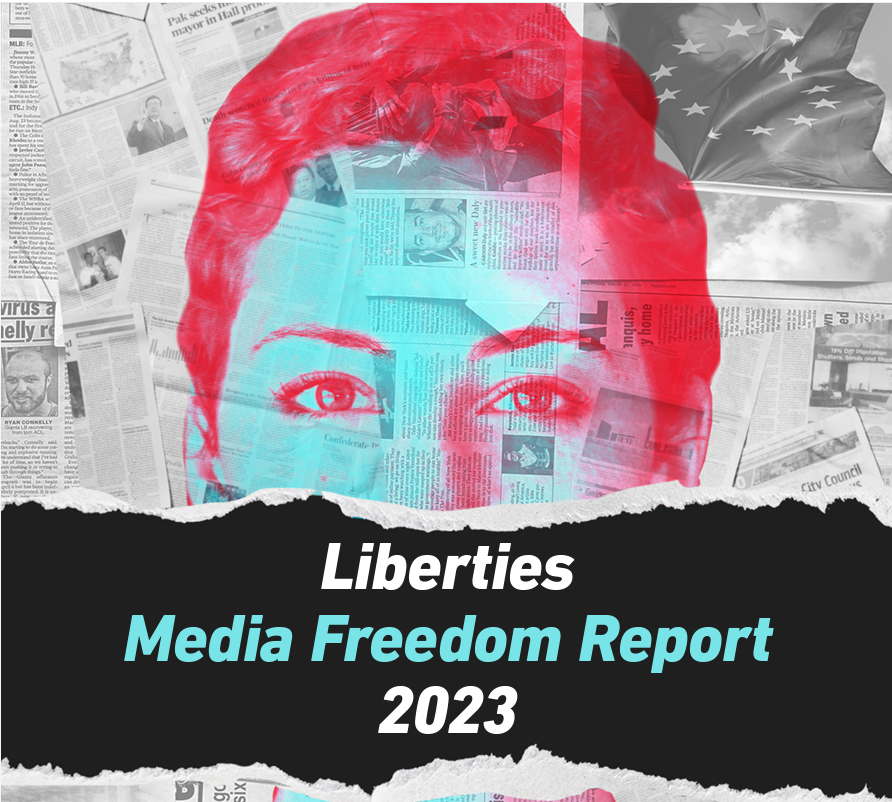Media freedom in the EU is in steady decline
Physical assaults, often by the police, and lawsuits against journalists are on the rise, data protection rules are abused to limit freedom of information, the unchallenged concentration of media ownership threatens pluralism, and national security is used as a pretext for laws restricting freedom of speech. These are the problems reported in the previous year in most EU countries and which remain unresolved (and in some cases, have even worsened) in 2022, according to the Liberties Report on Media Freedom 2023, published today. In Italy, the greatest concern is linked, on the one hand, to reckless lawsuits against journalists which put their work at risk, especially considering that, in some cases, these lawsuits were initiated or endorsed by people who now hold pivotal roles in the country’s government; on the other hand, to the constant politicisation of public television, which undermines journalists’ freedom.
Produced by more than 20 civil liberties organisations from across the EU, the Report provides evidence and analyses the main developments in media freedom and pluralism, safety and protection of journalists, and freedom of expression and information in 2022, a year in which media markets have been shaped not only by key legislation such as the adoption of the Digital Services Act and the Digital Markets Act or the proposed European Media Freedom Act, but also by Russia’s invasion (and disinformation) in Ukraine or general elections in Bulgaria, Hungary, Italy, Slovenia or Sweden. The main findings of the Report are:
- The media is controlled by too few parties. The strong and persistent concentration of media ownership threatens the diversity of media voices and creates more opportunities for distorted information. Last year, Poland’s second largest press distributor, acquired by a state-owned energy company in 2020, terminated its distribution contracts with independent media. In the Czech Republic and France, newspapers are heavily concentrated in the hands of billionaires. Public service media are under government control in Hungary and Poland.
- The jobs of journalists are less secure and SLAPPs are on the rise. In many countries it has become increasingly difficult for journalists to do their job: they face harassment, physical and verbal attacks, especially online or during protests, as reported in Belgium, Croatia, the Czech Republic, France, Germany, Ireland and the Netherlands. Remarkably, the police are often in charge. The number of abusive lawsuits, so-called SLAPPs, is increasing in Bulgaria, Croatia, Estonia, France, Germany, Hungary, Italy, the Netherlands, Poland, Slovenia, Spain and Sweden. Guarantees to protect journalists and their sources from state surveillance are insufficient and women continue to be paid less than their male colleagues and are more likely to be harassed and threatened, especially online (in Belgium, Italy, Ireland, Spain, Romania).
- Restriction of freedom of information and abuse of data protection rules. Freedom of information is restricted due to abusive application of data protection laws or slowness in processing requests for information (Belgium, Croatia, Estonia, Germany, Italy, Ireland, Lithuania, Poland, Spain).
“Media freedom is a prerequisite for stable democracies in the EU. Liberties’ Media Freedom Report 2023 reveals that media freedom was in decline in 2022 and most governments clearly neglected to address the main problems reported in their countries. However, the good news is that the proposed European media freedom law has the potential to strengthen media freedom and pluralism across the EU and address the issues identified in the Report. In addition, European lawmakers must pass a strong anti-SLAPP directive to protect journalists from bogus lawsuits. The Commission should launch infringement proceedings against non-compliant member states and keep up the pressure through the rule of law conditionality mechanism,” said Jascha Galaski, advocacy officer of the Civil Liberties Union for Europe.
“Daredevil lawsuits against journalists are one of the main problems that affect and can affect press freedom in Italy. Often used even before the publication of investigations, in fact, they can trigger self-censorship mechanisms, especially for those who work in independent media and, as a result, are also more exposed to facing legal costs. In a number of recent rulings, the Constitutional Court had intervened on the subject with reminders to Parliament, also with reference to the prison sentence for journalists in cases of defamation in the press. However, the political forces, to date, have never given priority to this issue that, instead, is fundamental to fully recognising the freedom of the press provided for in Article 21 of the Constitution. We therefore hope for a targeted intervention soon’ said Arturo Salerni, President of the Italian Coalition for Civil Liberties and Rights (CILD).
Download ‘Liberties Media Freedom Report 2023’ here
ABOUT THE REPORT
The Liberties Media Freedom Report 2023 is the second annual report on media freedom in the European Union (EU) produced by the Civli Liberties Union for Europe (Liberties) and covers the main developments in media freedom in 2022 in eighteen countries: Belgium, Bulgaria, Croatia, Czech Republic, Estonia, France, Germany, Hungary, Ireland, Italy, Lithuania, the Netherlands, Poland, Romania, Slovakia, Slovenia, Spain and Sweden. The Report was compiled with the participation of our members and partner organisations in eighteen EU countries. See the previous Media Freedom Report 2022.





